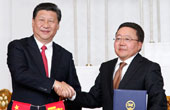Deeper SCO cooperation promises regional peace, development
Updated: 2014-09-11 17:18
(Xinhua)
Comments Print Mail Large Medium SmallDUSHANBE - Leaders of the Shanghai Cooperation Organization (SCO) member states are gathering on Thursday and Friday in Dushanbe, the capital of Tajikistan, for a summit that is set to chart the course of the regional group's development for the next decade.
It is particularly notable that the leaders are expected to endorse a series of legal documents to pave the way for the much-expected SCO expansion and infuse fresh vigor into the group's future development and boost its influence and appeal on the international arena.
The anticipated achievement will testify to the rest of the world that the SCO is a truly open and equal platform for safeguarding regional peace and development, not an exclusive and ambitious China-led "military alliance" as portrayed by some Western powers.
Indeed, the fact that the SCO was named after a Chinese city has already dropped a hint that China, the world's second largest economy, would be playing a leading role in the group.
However, those in the West should be reminded that leadership is not a synonym of dominance. All SCO members share equal rights in the bloc and have for years come under the same roof to strive for their common aspiration for regional peace, common development as well as a more balanced international order.
"SCO members have created a new model of international relations - partnership instead of alliance," wrote Chinese President Xi Jinping in an article published in a Tajik newspaper prior to his attendance of the SCO summit.
Founded in 2001, the SCO groups of China, Kazakhstan, Kyrgyzstan, Russia, Tajikistan and Uzbekistan, covering about three-fifths of the Eurasia land mass and accounting for 14.9 percent of the global economic output.
In the beginning, these Eurasia neighbors were brought together by their shared quest to tackle the dire security situation in this region.
Northwest China and part of the Central Asia are troubled by "Three Evil forces" - terrorism, separatism, and extremism. Drug trafficking and transnational organized crimes run rampant in Afghanistan and Pakistan. A barrage of other unconventional security menaces are also piling up in such fields as finance, information, food, and environment protection.
Over the past decade, SCO members have made concerted efforts within the SCO framework to effectively deter the mounting security threats and challenges through the creation of transnational anti-terror agencies and the staging of more than 10 multinational joint drills, among others.
Nowadays, as their strategic interests become increasingly aligned and intertwined, the SCO members have seen their cooperation, with economy and security as the "two wheels", significantly expanded and diversified.
China, which saw a nearly tenfold increase in its trade with other SCO members from 2001 to 2011, has raised a host of strategic concepts for common development, including the building of a Silk Road economic belt, which will engage and benefit SCO's all six members and five observers, namely Afghanistan, India, Iran, Mongolia and Pakistan.
In the face of constantly changing international and regional landscapes,the SCO members have become patrons of regional peace and partners of common development, and are destined to play bigger roles and shoulder larger responsibilities in the near future.
Related Stories
Backgrounder: Basic facts about SCO 2014-09-11 16:53
Chinese president arrives in Tajikistan for SCO summit, state visit 2014-09-11 15:52
Russian FM: SCO accords with realities of 21st century 2014-09-11 13:09
Xi's attendance at SCO summit, Asian visits to boost neighborhood diplomacy 2014-09-11 09:53
President Xi attends SCO summit, visits four nations 2014-09-11 09:17
Xi pledges to boost China-Tajikistan ties, SCO development 2014-09-11 09:10
SCO outshines NATO in valuing cooperation 2014-09-11 07:51
Big Talk






